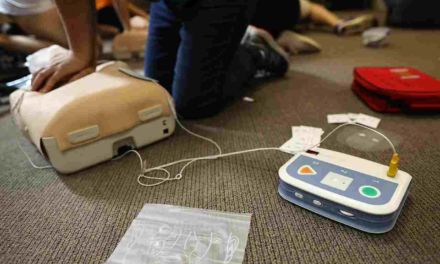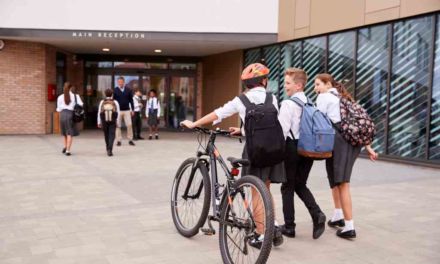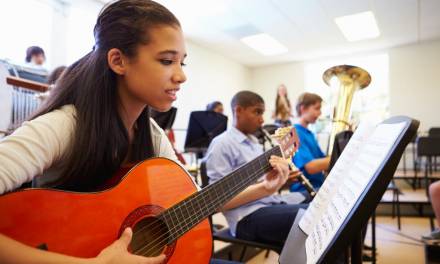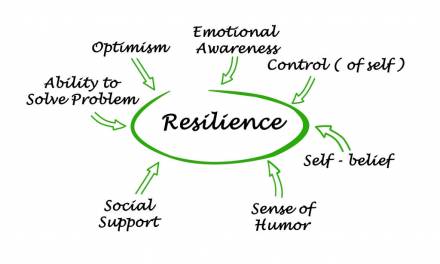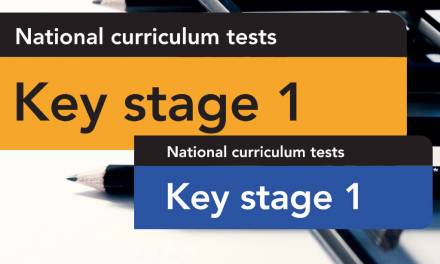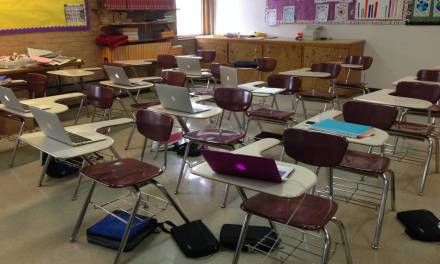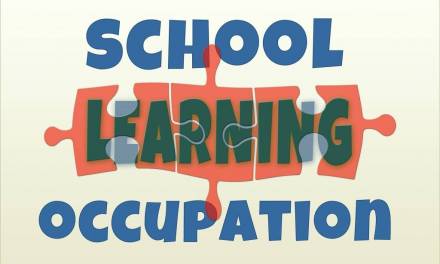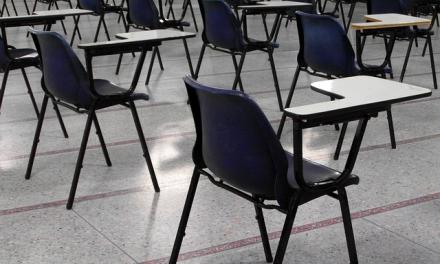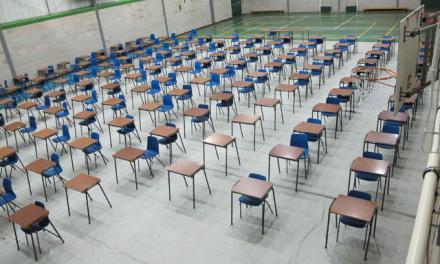
School Improvement
RECOMMENDED
Providing Tailored Support for Exam Success
Reading time: 3 minutes
Exam season. Those two words can strike fear into the hearts of even the most diligent learners. The pressure to perform, the sheer volume of material, and the anxiety of the unknown can create a daunting challenge. But what if we shifted the focus from a one-size-fits-all approach to a more personalised, tailored support system?
Read MoreChallenging Behaviour & Understanding 5 Root Causes
Reading time: 2 minutes
5 Last minute exam survival tips
Reading time: 2 minutes
Exams are stressful enough without the added pressure of feeling unprepared. But sometimes, life happens, and you find yourself with a stack of notes and a rapidly approaching deadline. However, it is important not to panic. If you’re down to the wire, there are strategies you can use to maximise your chances of success.
Read More5 Tips for conquering exam stress
Reading time: 2 minutes
Exam season can invite pressure, stress and anxiety in students that can be difficult to overcome. However, with a bit of patience, support and guidance you can ensure that you smash whatever exam crosses your path. We take a look at five ways you can calm your nerves and approach your next examination with confidence.
Read MoreA guide to supporting autism in education
Reading time: 3 minutes
Autism can present various challenges for children and families, especially concerning education and development to adulthood. However, there are several avenues to explore that can implement supportive strategies to overcome barriers relating to autism.
Read More5 reasons why celebrating student success is important
Reading time: 3 minutes
Supporting students to achieve the best possible outcomes in education can present difficulties. However, we must consider a child’s thoughts, and feelings and provide positive behaviour reinforcement whilst celebrating their successes to instil confidence and self-esteem.
Read More5 ways you can improve safeguarding
Reading time: 2 minutes
Safeguarding students should be paramount within the education system. As stated in KCSIE 2023, safeguarding is everyone’s responsibility. Robust and stringent measures need to be implemented to ensure everyone involved in a school environment is protected and secured.
Jonathan Keay, Senior HMI stated:
Read More3 ways to create a positive classroom environment for reintegration
Reading time: 3 minutes
Students who experience barriers to their learning may sometimes find it difficult to engage with their education, subsequently resulting in loss of learning.
It’s important that students feel welcomed, be able to voice their opinions and flaunt their creativity whenever possible. By encouraging this and creating a positive classroom environment, students will feel more inclined to attend school and engage properly with their education. The school inspection handbook states:
Read MoreUsing an online platform to support anxiety
Reading time: 2 minutes
EDClass had a great discussion with specialist learning assistant, Katie Bullimore, from The Garibaldi School in Nottinghamshire to discuss why they chose EDClass to help support their students struggling with anxiety and other mental health issues.
Read MoreHow we can support children who have experienced trauma
Reading time: 4 minutes
Children who have been exposed to trauma or Adverse Childhood Experiences (ACEs) may exhibit certain behaviours or refuse to attend education. How can we overcome their barriers and what can we implement to support them?
EDClass spoke to Danny Wolstencroft, from Lads Like Us, who are safeguarding consultants going across the UK to discuss trauma-informed care to all types of professionals. Their goal is to inform professionals on how to effectively support children who have experienced trauma and what strategies we can implement to overcome barriers.
Read MoreWhat to expect for 2023 GCSEs?
Reading time: 3 minutes
Examinations are quickly getting back to the pre-covid times. With normalcy, GCSE 2023, students have been facing a lot of anticipation regarding what they will be facing and what they can expect, especially since the government’s decision to reinstate the pre-covid examination grading scale.
GCSE exams are scheduled to be held during May and June of this year. If you too are wondering about the exams and have little to no idea, this blog will cover all aspects of the 2023 GCSE exams and will be answering some of the most-asked questions.
Read MoreImportance of defibrillators in schools
Reading time: 2 minutes
With initiatives to roll out defibrillators in schools, there has been a significant debate about whether they are needed or not. Defibrillators are essential equipment for dealing with cardiac incidents and can be the difference between life and death for any potential patient. With thousands of cases of sudden cardiac arrest occurring every year, less than 10% survive, and of those that do, having access to a defibrillator within minutes of the incident is a key factor.
Read MoreBenefits of twilight sessions to impact behaviour and whole-school improvement
Reading time: 3 minutes
School hours are limited, and educators often feel the impact of this time constraint on the quality of education. Additionally, these educators often feel exhausted from dealing with students with disruptive behaviour. Outstanding teaching and learning depend on effective continuing professional development (CPD).
The solution for improving the quality of teaching and service educators provide is the twilight session organised by the school authorities. These sessions aim to deliver teacher training and contribute to the whole-school improvement.
Read MoreWhat to prepare for in Ofsted inspections
Reading time: 4 minutes
Ofsted is the Office for Standards in Education, Children’s Services, and Skills. This governmental body is responsible for regularly inspecting services providing education to young learners. These services range from childminders to training providers, schools to local authorities. The governmental body further uncovers what they find in the inspection. These findings are then shared with Parliament, parents, carers, and commissioners.
The other side of the story is that the inspections aimed at improving the quality of education at all levels might seem tedious to the institutions. However, schools and other educational institutions can successfully prepare their best to qualify for these inspections.
Read More5 strategies to impact whole-school attainment
Reading time: 3 minutes
The standards for a school improvement plan, also known as a SIP, might vary from state to state. Still, its overall objective is always the same: to establish goals, strategies, and action actions to improve the overall quality of the education that kids receive. In most cases, the objectives of school improvement plans are matched with the outcome measures of statewide examinations. A school strategy should be a well-documented plan that outlines the long-term goals your institution has set for itself and the path it intends to take to reach those goals. Five of the best strategies to bring whole-school attainment are given below:
Reducing teacher workload to improve pupil outcomes
A teacher who is less worried, less pressurised, and more rested is likely to be more energetic in the classroom. This is something that should go without saying, but we can always hope that it does. This does get transmitted to the students as well, impacting their class performance. While the amount of work may increase owing to changes in the law, which is unavoidable, the institution should do its best to decrease teacher workload.
Read MoreTips to save on school budgets
Reading time: 5 minutes
Saving money for a school budget is the desired outcome for many establishments within the education sector. Why is this and can an online alternative provision assist?
EDClass’ teacher, David Hickey, taught as a headteacher across schools in South Yorkshire and Derbyshire and highlighted how schools should take appropriate steps to ensure that they accommodate their budget requirements. Mr Hickey said:
“Schools should consider collaborating together and sharing costs with other schools in terms of staffing and how they share their resources. Certain schools, that aren’t necessarily academies, may have a soft federation within the school and share things with children so they don’t feel left out.”
Read MoreWhat is chronic fatigue?
Reading time: 3 minutes
Chronic fatigue syndrome (CFS) is a complex illness defined by intense exhaustion that lasts for at least six months. This diagnosis is done when an underlying medical condition cannot completely explain this tendency. The cause of chronic fatigue syndrome is unknown. The tiredness is made worse by any exertion, whether physical or mental, yet it does not improve by resting. There are some hypotheses floating around on what might be the root cause of chronic fatigue syndrome. These range from viral infections to psychological strain. Some professionals think that a confluence of many circumstances might cause chronic fatigue syndrome.
Read MoreMonitoring Students that are School Refusers
Reading time: 2 minutes
School refusal can manifest in many forms, and for many different reasons. It is usually expressed as severe emotional distress at the prospect of attending school, caused by a number of different issues or conditions. It may be a short-term issue caused by a specific incident, or it could be a long-term problem that occurs continually or intermittently.
From incidents of bullying or other social problems to anxiety, school phobia, issues with separation from parents, unidentified special education or mental health needs and more, no case of school refusal is the same, there are endless reasons behind the problem, and identifying those is crucial in developing an appropriate response early on.
Read MoreMental health issues in education – time to improve
Reading time: 5 minutes
Mental health concerns within education have increased over the past few years. Concerning the recent SEND review and alternative provisions, what can be done to improve the situation and the negative stigma that surrounds certain APs?
3 main concerns that the SEND review highlighted are that children are making inadequate progress, families are dissatisfied with the situation and financially the situation isn’t sustainable.
Read MoreWhy Early Intervention is Necessary in Schools
Reading time: 4 minutes
The recent SEND review has highlighted how intervention within schools needs addressing. Can primary schools and parental involvement help support early intervention?
The government has announced an additional £1 billion of investment in 2022-23, but the review has stated:
“Whilst future funding will need to take account of the increasing prevalence of children and young people with the most complex needs, this needs to be balanced with targeting spending more at strengthening early intervention.”
Read More4 tips on how to smash GCSE revision
Reading time: 3 minutes
With GCSEs returning for the first time in three years, student revision must be done correctly, so how can this be done? Look at these 4 great tips.
The Guardian recently released a story highlighting how in the UK “close to 2 million teenagers will be gearing up for their exams”. It suggested how students should start revising over Easter to get ahead and avoid stress before exams start.
So, here are 4 tips that could help with revision over Easter and beyond:
Read MoreHow non-attendees can pass GCSEs
Reading time: 3 minutes
Traditional GCSE exams are returning for the first time in three years, what can non-attendees do to help towards getting a pass grade?
Read MoreExam topics 2022 released – How will they go?
Reading time: 4 minutes
With the release of this summer’s exam topics swiftly upon us, are you and your students fully prepared for them? Here’s some advice for you and your students, who may be absent, and what to expect this summer.
Read MoreOnline exams – the better way of taking your exams?
Reading time: 2 minutes
Partly due to the current pandemic, online exams have become a practical alternative to paper exams, potentially for the better.
Read MoreChanges and cancellations hit exams in Scotland
Reading time: 2 minutes
Exams in Scotland are to be adjusted or cancelled in 2021, the Education Secretary has announced.
The biggest announcement has seen National 5 exams cancelled and replaced with teacher assessments and coursework.
John Swinney said it was likely students would face disruption and that the Covid-19 pandemic was “too big a risk“.
Here is what you need to know.
Read MoreCatch-up sessions for holiday
Reading time: 2 minutes
Parents can be fined for taking children on holiday during term time without the school’s permission because children miss valuable learning. For students who are absent, catch-up lessons for holiday learning time are vital to get them back on track.
The UK Government states:
You have to get permission from the headteacher if you want to take your child out of school during term time. And you can only do this if:
- You make an application to the headteacher in advance (as a parent the child normally lives with)
- There are exceptional circumstances
Being prepared for exams
Reading time: 3 minutes
School exams are to return in 2021 – the Education Secretary in Scotland, John Swinney, has said.
There was significant changes to original grading in the results of 2020 GCSEs and A-Levels, after exams this summer had been cancelled.
Mr Swinney was speaking at the National Parent Forum of Scotland. This blog post is about being prepared for exams.
Read MoreMoving around the building safely
Reading time: 4 minutes
The latest coronavirus guidelines provides tips for moving around the building safely.
Though mask wearing is only mandatory in local lockdown areas, a number of guidelines were implemented for keeping staff and students safe.
This blog post is all you need to know about bubble groups and moving around the building safely.
Read MoreAssessing and tracking students accurately and continuously
Reading time: 2 minutes
Tracking students is essential, especially in modern times where students are behind and the race to catch up is on.
By tracking students accurately and monitor your school can:
- Find precisely where individual students are in their learning against a set of learning intentions and success criteria
- Help students know what their next steps in learning are, which facilitates significant increases in their students’ achievements
Parental and pupil engagement are boosted by confidently and accurately reporting performance feedback to them. But why is it critical at the present moment in time to track and assess students accurately and continuously? This blog post explains.
Read MoreWilliamson determined 2021 exams will go ahead
Reading time: 4 minutes
Education Secretary Gavin Williamson has said he is “deeply sorry” to school pupils who had grades downgraded as a result of this summer’s exam algorithm and has said he is “determined” exams will go ahead in 2021.
The Education Secretary was speaking in the House of Commons on Tuesday – his first appearance in Parliament since the decision was made to award pupils with their predicted grades for this summer’s exams.
Find out what he had to say by reading the blog post below.
Read MoreHow to plan a creative curriculum for your pupils
Reading time: 3 minutes
By installing a creative curriculum in your school you can get the most out of the imaginative minds of your pupils.
It may be defined by topics or themes, or greater involvement of pupils in deciding what they are going to learn.
These are the benefits of a creative curriculum and the steps you can take to build one.
Read MoreInclusive education: what can be done to make the system more inclusive
Reading time: 2 minutes
Should GCSEs be changed to create a more inclusive education?
The flawed exam algorithm may have established a flaw in the goal of an inclusive education.
With pupils automatically disadvantaged based on where they are from, the system could be the strongest indicator yet that pupils from disadvantaged backgrounds have to work harder to achieve in the education system.
Experts have wade in on the debate about whether there need to be a revamp, including of the GCSE system, in order to make learning more inclusive.
Read MoreSchool catch up: changes to literature and history curriculum
Reading time: 3 minutes
A school catch up plan is in operation within many schools in the UK. Scotland have announced plans to get all pupils back to school over the next two weeks. In England, pupils will return full-time from September.
But the need to get children caught up on many essentials means changes to the curriculum in others.
Exam body, Ofqual, said they had “significant concern” about school’s abilities to cover all the subjects that form the basis of exam questions.
What could this mean for how education looks in 2020-21? This blog post explains.
Read MoreGCSEs: Students can sit exams if they don’t like results
Reading time: 2 minutes
Students can sit exams this autumn, should they disagree with predicted GCSEs in 2020.
Schools will determine an expected grade for pupils using a number of metrics.
If students feel they can do better than the result prescribed, they will though have an option to sit an exam. But how will this work in practice? This blog post explains.
Read MoreTarget cohorts with tailored learning
Reading time: 2 minutes
The plan to get children caught up quickly following school closures this Spring is now underway – and tailored learning should be at it’s heart.
The Government announced a £1 billion fund in June to catch up pupils who could have fallen up to 12 months behind.
By producing a tailored learning platform you can improve engagement and results for your students. Apply this across a cohort and you achieve results for all. But what is tailored learning and how can it improve outcomes for students?
Read MoreManage your 2021 GCSEs
Reading time: 2 minutes
Schools are returning full-time in September – and your priority should be those students with their GCSEs coming up who are now behind on their learning.
The return to secondary school has been led by Year 10 students, with pressure on them to get caught up quickly.
How should you go about getting students caught up and preparing them for their GCSEs?
Read MoreYour present Year 10s are your number one priority
Reading time: 2 minutes
Secondary schools in England are now open and the focus has turned to present Year 10s.
Exams may not be taking place this year, but next year’s Year 11 cohort may not be so fortunate. Therefore pressure is on Year 10s to get caught up quickly.
This blog post takes a look at the effects of the educational gap on GCSE students and what can be done to help students catch up.
Read MoreCoronavirus pandemic to exploit inequality in schools
Reading time: 8 minutes
Ofsted Chief, Amanda Spielman has said the coronavirus pandemic has caused ‘a crisis for all children’, as disadvantaged children look set to fall behind in education as a result of inequality.
BBC Newsnight this week reported that the pandemic could undo 10 years of improvements in the education sector. Children may have to go to school 7-days-per-week to make up for lost time. The pandemic is also likely to increase the north-south divide.
The situation has caused a great deal of concern for individuals across the education sector. But what difference is the crisis making to pupils from the most disadvantaged backgrounds – and how will this crisis affect everyone concerned?
Read MoreOpinion: coronavirus could make vulnerable pupils worse off
Reading time: 2 minutes
The coronavirus crisis could have damaging implications on the most vulnerable pupils in society, according to insight.
One London teacher explained “many of our students now bear extra responsibilities, from taking care of younger siblings to helping maintain the household and are less focused on their education. Their learning suffers from he added pressure, none of which is under their control”.
But concerns for vulnerable pupils could be far wider. Early indications suggest certain pupils are feeling ‘alone’ and intimidated by family members. Here is what we now how the coronavirus crisis is affecting some of the UK’s most at risk pupils.
Read MoreStudent grades: the challenge of ranking students to predict grades
Reading time: 2 minutes
Information is emerging about the methodology for awarding student grades for this academic year.
Grades look set to be informed by your current data and an element of student ranking within your subject. Grades will be moderated against prior KS2 data, prior school attainment data and national distribution of grades.
The process brings about many challenges – not least the threat of bias. But what should be taken into account to ensure a fair and justifiable approach.
Read MoreWhen is the best time to revise?
Reading time: 3 minutes
To revise is a crucial skill in preparing for exams. As end of year exams edge clearly, revision will form a crucial part of your strategy of best performing for an exam.
But when is the best time to revise? Is it during the day? Is it during the night?
Read MoreSubcontracting consultation: ESFA proposal to limit long-distance subcontractors
Reading time: 3 minutes
The Education and Skills Funding Agency (ESFA) has launched a subcontracting consultation, with plans to cap business spending and ensure only local or digital consultants are used by contractors.
The ESFA has issued ten recommendations on changes to subcontracting rules – with the aims of reducing costs and eliminating poor arrangements. If you are a provider or subcontractor, please read the information below.
Read MoreEDVille: our educational games app is free for the duration of the BETT Show
Reading time: 3 minutes
Our educational games app, EDVille, is free for the duration of the BETT Show which takes place on 22-25 January 2020.
Read MoreChildren’s commissioner speaks of concern over school isolation use
Reading time: 4 minutes
The children’s commissioner, Anne Longfield OBE, has issued concern over the use of school isolation booths, according to the Guardian.
Ms Longfield described “horror stories” as she visited isolation units in schools throughout the UK.
Read More5 potential career paths for…music students
Reading time: 3 minutes
Although music lessons are under pressure because of budget restrictions in schools, there is a wide range of career opportunities for musically gifted students who choose this career path.
A knowledge of music – both theoretical and practical – can open doors into teaching, music production, broadcasting, sound engineering, songwriting and even therapy.
Read MoreIlliteracy in secondary education – what can you do to help?
Reading time: 2 minutes
In 2016, the OECD examined the literacy rates of 16- to 19-year-olds in 23 OECD countries and came to a startling conclusion – England occupied the bottom spot with more than 1 in 5 young adults having a low level of literacy.
Read MoreEmpowering staff to introduce new teaching methods
Reading time: 2 minutes
Innovation in the classroom should begin with teachers, yet are they truly empowered to take control and introduce new methods and techniques into their teaching?
Read MoreMulti Academy Trusts – Break the barriers of academic failure
Reading time: 3 minutes
The landscape of multi-academy trusts (MATs) seems to be one of polar opposites. Some assist their schools in overcoming academic failure, others seem to be powerless.
Read MoreV Certs – will they bridge the skills gap for employers?
Reading time: 2 minutes
V Certs are the most recent vocational qualification open to students who are 14 – 16 years old but could they really provide a solution for the skills gap in the UK?
Read More5 potential career paths for…design and technology students
Reading time: 2 minutes
Design and technology skills are applicable to a wide range of careers, from carpenter to aerospace engineer.
For students with creative energy, then, the various areas of design and technology offer an exciting path beyond school.
Read MoreWhat can teachers do to increase the number of school leavers taking up apprenticeships?
Reading time: 2 minutes
Despite the introduction of the Apprenticeship Levy in April 2017, there have been four successive quarters of decline in the number of reported apprenticeship starts.
If all parties have a role to play in increasing the uptake of apprenticeships, what can teachers do to help facilitate this?
Read More5 simple strategies…to increase parental involvement in schools
Reading time: 3 minutes
Between 1997 and 2007 parental involvement in schools sky rocketed. Over the course of a decade, more parents and guardians attended general meetings, had a meeting with a teacher, attended a school event or volunteered.
Read More5 potential career paths for…classics students
Reading time: 4 minutes
Latin, Classical Greek, ancient history, philosophy – these are a few of the subjects that fall under the category of ‘classics’.
Some wrongfully believe classics subjects to be so firmly rooted in the past, that they equip students with few skills for the modern world.
Read More5 potential career paths for…computer science students
Reading time: 3 minutes
Your computer science student sits in front of you and asks that ominous question – “where next?”.
While some subjects are an unnatural fit for many careers, you’re going to have good news for this particular student.
Read MoreHow to encourage apprenticeships in your school
Reading time: 3 minutes
Apprentices earn, on average, £100,000 more than other employees over the course of their life, and today can take their pick from over 200 differing professions – from plumbing and music, to social media and marketing. And, as it turns out, apprentices are good for business, too…
Read More5 potential career paths for…biology students
Reading time: 2 minutes
With a skills gap currently existing in STEM subjects, it has become more important than ever to encourage young people to pursue careers in the fields of science, especially girls, who have been shown to still lack confidence in the subject.
Read MoreOffering relevant career guidance in schools
Reading time: 2 minutes
The requirement of schools to offer career guidance has become more important since the Education Act 2011 enshrined this in law. As a consequence, many schools have increased the impact of their in-house career guidance tools.
Read More5 potential career paths for…geography students
Reading time: 3 minutes
Geography is far from just studying countries and maps. Indeed, careers utilising geography skills involve research, data analysis, and exceptional communication. As you can imagine, these translate to a wider range of careers for geography students.
Read More5 potential career paths for…modern foreign languages students
Reading time: 2 minutes
A few years ago, a report was released stating that British children were considered to be the worst in Europe when it came to learning foreign languages. However since then, more effort has been devoted to rectifying the problem, and with primary school pupils now having compulsory foreign language lessons, it is hoped that the interest in the field will increase.
Read MoreHelp your students improve their emotional and academic resilience
Reading time: 3 minutes
Emotional and academic resilience is an integral aspect of students reaching their potential. Innate talent and application can only help pupils reach their targets if resilience is built up alongside them.
Read More5 simple strategies…to prepare students for exams
Reading time: 3 minutes
Exam season is difficult for everyone, and many students will find themselves feeling stressed as well as overwhelmed.
It can be hard to prepare them for the upcoming tests, but you can at least try to make it easier on them. Here are five simple strategies that you can use to help prepare students for exams.
Read More5 potential career paths for…art and design students
Reading time: 3 minutes
The art and design industry is incredibly diverse, yet no matter the specific niche one thing is universal – entrants to this industry must work their way up.
Even where further education has been followed, junior posts are the generic starting point to prove your mettle and demonstrate creative flair and imagination.
Read MoreRecruit or train? Which is best when you have a skills gap in your school?
Reading time: 3 minutes
With the government raising the bar ever-higher on standards within the education system, a skills gap is becoming ever-more evident in UK classrooms.
For example, secondary school teachers are expected to include cross-curricular links to literacy within their subject material, and primary school teachers have to teach a more demanding maths and English curriculum as well as modern foreign languages and computer coding skills.
Read More5 potential career paths for…history students
Reading time: 3 minutes
Students with a interest in history can occasionally feel discouraged by the emphasis on STEM subjects. The perception that only studying those subjects will lead to a successful career can dissuade students from choosing a non-STEM career path.
As teachers, you know the most important thing is to encourage pupils to discover which path they want to take, and offer them as much support and encouragement as possible.
Read More5 simple strategies…to help prepare students for job interviews
Reading time: 4 minutes
Your students are ready to seek employment. After more than a decade of learning, their entire career could be influenced by the first job position they hold. There’s a lot riding on that interview – for which your pupils must be informed, calm and confident.
So how can you help them prepare for job interviews? Here are a few suggestions.
Read More5 potential career paths for…economics students
Reading time: 3 minutes
Economics influences every aspect of the modern world. As such, students who have an interest in, and choose to study, economics have a variety of career paths to choose from.
The skills learned through economics are also highly transferable, allowing students to move into fields they wouldn’t initially have contemplated.
Read MoreWhat did we learn from the new GCSE results?
Reading time: 2 minutes
Pay attention at the back – the papers are marked, the grades are in. The long-awaited year of the GCSE shakeup can now be dissected and analysed.
The question is – what did we learn from the new GCSE results?
Read More5 potential career paths for…physics students
Reading time: 2 minutes
Physics is not only an exciting and engaging course of study, it is also the gateway to a number of satisfying and rewarding careers.
From traditional scientific industries to more unusual pathways, there are a great many opportunities open to physics specialists which are sure to appeal to students with an interest in the field.
Read More5 potential career paths for…maths students
Reading time: 3 minutes
Numbers, equations, facts and figures. For many of us a maths-focused career where every day is filled with number-crunching would be far from a welcome prospect.
However, for maths students and for those who are naturally skilled with numbers, the following five career paths can offer rewarding opportunities with excellent career prospects.
Read More5 potential career paths for…chemistry students
Reading time: 2 minutes
While many students have an image in their minds of chemists as men in white coats, the reality is very different.
For a start, organisations such as WISE are encouraging more women into science-based careers, and more opportunities exist for women than ever before in fields relating to chemistry.
Also, although many chemistry-related career paths are based in laboratories, studying chemistry opens up a world of other opportunities too.
Read More5 potential career paths…for English students
Reading time: 3 minutes
“Are you going to be a teacher when you get older?” is a question that many English students will hear during their time at university.
Whilst it is true that a significant number of English students love the idea of teaching after completing their degree (and there is nothing wrong with that – this is an education blog after all!), there is a variety of potential career paths for English students.
Read MoreExam results – are they an accurate measure of achievement?
Reading time: 3 minutes
The subject of whether or not exam results are an accurate measure of achievement is one that has found itself in the headlines quite frequently over the past couple of years.
There are many voices on either side of the debate – all seemingly promoting logical yet diametrically opposing views. So, do exam results matter and are they an indicator of ability?
Read MoreEffective and constructive feedback for teacher development
Reading time: 3 minutes
Effective and constructive feedback is key to a teacher’s progression – central to their improving their own performance and continually positively impacting on their students.
It takes a concerted effort to transform feedback into coaching that is viewed as positive and providing teachers with set goals and a clear understanding of what’s next for their career.
Read MoreKS1 SATs could be replaced by assessments. Is this a good idea?
Reading time: 2 minutes
At the end of March, 2017, the government announced that they were looking to replace KS1 SATs with teacher assessments.
For years, teachers and parents alike have been pressuring the government to scrap SATs for seven-year-olds because they felt that these tests placed unnecessary stress on everyone involved, and were not reliable indicators of a student’s ability.
Read MoreUsing mindfulness to help overcome stress
Reading time: 2 minutes
Exam times are a very stressful period for students, and while a small amount of stress can be motivational, too much is the opposite and means that students won’t be able to perform at their best.
But what can be done to alleviate stress during this very important time? Mindfulness is a bit of a buzzword at the moment and it’s easy to dismiss it as the latest fad.
Read MoreThe new GCSE grade scale: what does the change to 1-9 mean?
Reading time: 2 minutes
As is commonplace for those in the education system, the past 24 months have marked much change, not least of which is the new GCSE grade scale.
Teachers, parents and pupils alike have faced a transition from the old scale of U – A*, to U to 9. Let’s explore what this change means and why it has been put in place.
Read MoreHow diet can affect learning and memory
Reading time: 2 minutes
You have more than likely heard that there is a correlation between the diet of a child (and even an adult) and their ability to learn as well as retain information. In fact, it is this very correlation, along with the rise in childhood obesity, that led to many school lunches being completely revamped and made that much healthier for children.
Since then, there have been many positive effects observed – such as better concentration and improved learning abilities. But how can diet affect learning and memory, and which foods are best to eat?
Read MoreSchool league tables – what do they really mean?
Reading time: 3 minutes
League tables could be said to be a snapshot of the quality of a school; a grade which represents every lesson, each extra pastoral support meeting and the blood, sweat and tears of every teacher and pupil within a school over the past 12 months.
But can league tables could ever represent all of these elements? This question has been at the heart of a 2017 revolution in how the league tables are calculated. Let’s look at the before, the after and the impact of both.
Read More5 simple ways…to reward students
Reading time: 2 minutes
There has been much research on the topic of just what it is that makes for an effective reward system; despite extensive academic literature on the subject (and debates that rage on between topics such as intrinsic and extrinsic motivation) rewards really needn’t represent a complex, time-consuming system that adds to your everyday pressures as a teacher.
Here are five ideas that work and require minimal effort on your part.
Read MoreDoes Progress 8 help vocational learners?
Reading time: 2 minutes
Progress 8 was launched amid a flurry of educational sector changes; for years, teachers and school management have done battle with all sorts of metrics, and the balance between the focus on grades and what’s best for the pupil.
There were positive expectations when Progress 8 was introduced back in August 2016. Some seven months on, we look at what this change has meant for the educational sector, and moreover, what it has meant for vocational learners who had previously been relatively overlooked by the old system.
Read MoreHow much freedom do students really have over their subject choices?
Reading time: 2 minutes
As you progress throughout high school, you learn more and more about the type of person you are going to grow up to be.
You will discover new things, hidden talents and hopefully realise what you want to do with your life, or at least, what direction you want it to go in. This is why schools let students choose which subjects they want to take…to an extent.
Read MoreUniversities vs. Apprenticeships
Reading time: 2 minutes
After finishing college, it is time to think about your future career all the more seriously.
The two main considerations to make are whether you want to continue your education in a formal setting, or whether you want to start some work based learning?
Read MoreCelebrating Victories in the Classroom
Reading time: 2 minutes
For any teacher, the balancing act in recognising every student’s achievement is a tough one. After all, schools, teachers and educational professionals have never faced more targets to hit and more metrics to yardstick their students against – whilst students themselves now know all too well of exactly how they’re performing compared to their peers and the wider averages.
For the less able in classes of mixed abilities, this can often result in far less frequent recognition – whilst the more able follow a cycle of achievement, and recognition (which then further bolsters their progression) – ultimately, this is the purest demonstration of a ‘self-fulfilling’ prophecy.
Read MoreStrategies to Deliver School Improvement
Reading time: 2 minutes
Strategic planning in schools has evolved in recent years, transforming itself from a one-year model to a cyclical one that promised long term changes.
As the environment around your school changes, so too must the way your school functions, and this is where the strategies come in.
Read MoreThe drop in GCSE results – what went wrong?
Reading time: 2 minutes
This year’s overall A* to C pass rate has suffered its sharpest decline since GCSEs were first sat in 1988, down 2.1 percentage points from 69% in 2015, to 66.9%.
A browse through the many column inches of blame-laying reveals two popular culprits: the new requirement for pupils to resit Maths and English if they don’t secure a grade C in Year 11, and the English Baccalaureate (EBacc).
Read More10 Key Changes to the GCSE
Reading time: 2 minutes
Summer 2016 was a headline-grabber for all the wrong reasons as the lowest GCSE results in a decade were unveiled. Michael Gove claimed the changes would “address the pernicious damage caused by grade inflation and dumbing down”.
Will next year’s results be easier to digest after the first new GCSE exams have been taken? Only time will tell.
Read MoreIn the news: 5 EBacc GCSEs to be studied by all pupils
Reading time: < 1 minute
Yesterday, news emerged on the plans due to be put forward by Nick Gibb, schools minister, that all secondary school pupils in England will be expected to take five GCSEs in EBacc subjects: English, maths, science, a language and history or geography.
The Conservatives’ election manifesto stated that if schools did not offer these, they would not be eligible for a top Ofsted rating (BBC).
Read MoreRaising Aspiration in Younger Students
Reading time: 2 minutes
It has been suggested that a person’s aspirations are shaped by the likelihood of them being achieved. When linked with the concept that a child’s belief in their ability to achieve something is in part based on whether they see those they consider to be peers achieving in a similar way, then it is no wonder that the biggest challenge to raising aspiration in schools is socio-economic status.
The longer the negative messages received by a child go unchallenged the harder they are to overcome, which is why raising aspiration in younger children is increasingly an issue being raised by school leaders.
Read MoreIpsative Feedback and Assessment
Reading time: 2 minutes
There is such controversy surrounding assessment in the current educational climate that it is hard to see the wood for the trees. Inspectors will expect each student to know their own targets and current levels of progress but many teachers find that this can demotivate those whose progress is perhaps at a lower level than that of their classmates.
Competition within a class can be motivational for those at the top but for those at the bottom it has the opposite effect. One method that can help to combat this issue is using an ipsative form of assessment and feedback.
Read MoreRaising Aspiration with Parental Engagement
Reading time: 2 minutes
When schools are looking to raise aspiration, parental power is an invaluable and powerful way to enhance and introduce enthusiasm and motivation.
Success is seen at its highest when schools and parents work together as a partnership, but whilst almost all schools involve parents in activities at the school itself, this is parental involvement rather than engagement and does not directly affect achievement as opposed to direct parental engagement which increases aspiration for all the family.
Read MoreImproving the Attainment of Low Literacy Pupils
Reading time: 2 minutes
Those who perform poorly at school overall are the most likely to have poor reading and writing skills. Socio-economics play a large role in the profile of a pupil with low literacy along with gender.
It has been evidenced that boys are twice as likely as girls to have low literacy skills at the point of leaving school and this barrier can really hold those affected back when looking at career and lifestyle choices.
Read MoreHighlighting the Importance of English and Maths to Teenagers in Careers Advice
Reading time: 2 minutes
Engaging teenagers in Maths and English can often feel like an uphill struggle – particularly if their levels of numeracy and literacy are low. It’s even more of a challenge to emphasise and convince them then that these are probably the two most important subjects to focus on when planning their career path.
Where being a celebrity is now a very popular answer to ‘what career do you think you want’ and then specific replies being that being either a footballer, model or reality TV star is at the top of the list, there’s a falling perception in some teenagers that Maths and English are of any value.
Read MoreImproving attainment for C/D border students
Reading time: 3 minutes
Improving attainment for C/D border students can mean a huge difference to their lives. It can be the difference between being offered a place at their FE college – or not, or it can mean starting an Apprenticeship – or not.
The reasons pupils fall into the C/D sector of a year are varied, but the solution is intervention to look to resolve the issues in the run up to exams as much as possible.
Read MoreControlling Classroom Lateness
Reading time: 3 minutes
Late arrivals to a classroom are disruptive to the flow of the teaching and to the concentration levels of the rest of the pupils. Those who are chronic offenders are often missing out on important information and allowing the problem to continue will lead to them being late even more often. This can then encourage those who are punctual to join in the feeling of apathy and lack of personal time management.
Read MoreTeaching financial literacy
Reading time: 2 minutes
With financial literacy now firmly part of the newly introduced curriculum for maths and citizenship, schools have to be focused on looking at the opportunity to equip their pupils with the skills they will need to manage money throughout life.
Read MoreMindfulness in schools
Reading time: < 1 minute
Teaching mindfulness is becoming increasingly popular in primary and secondary schools, and with good reason.
This mind-body approach focuses on living in the present moment and being aware of our thoughts and feelings.
Read MoreEffective Summative Feedback
Reading time: 2 minutes
Whilst formative feedback is used as a tool for regular evaluation of achievement or to look at and set up methods to stem the areas where students need to make improvement, summative feedback is just as crucial and should be used in conjunction with formative assessment to give a rounded picture of learning rather than purely on its own.
Summative feedback can be used just as effectively as formative feedback as there are a number of tools and processes for obtaining the data and information regarding the learning which has taken place.
Read MoreSetting Goals and Targets
Reading time: 3 minutes
Evidence of learning is one of the most important benchmarks within teaching. It’s a tool which is part of the whole educative experience for all involved; learner, teacher and perhaps at times the observer. This evidence can be gathered through a range of ways, but the cornerstone of all is the setting of goals and targets.
By undertaking this work at different stages of the term or course; during the scheme of work and lesson planning and at set points as an evaluation tool, it is a way for the future planning of learning.
Read MoreDeveloping Critical Thinking Skills in Students
Reading time: 2 minutes
Students have great capacity to develop and to better every aspect of their lives whilst at school and in preparation for further education or work.
Most capacity though lays dormant unless challenged – similar to a ballerina at the barre each day or a violinist practising and learning new scales every day. If pupils take their thinking methods for granted and they aren’t given the opportunity to have knowledge of and embrace the skill of critical thinking they won’t improve.
Read MorePromoting Student Achievement
Reading time: 2 minutes
This blog touches on one of the biggest challenges facing anyone in school leadership: how to promote student achievement.
Improving the raw data that defines the progress of the pupils is the bottom line to end all bottom lines and can make or break an inspection.
Aside from the raw data, the phrase all head teachers want to hear in an inspection report is that ‘a culture of achievement’ has been created in their school. So how does this happen?
Read More5 Simple Strategies…for Extension Work
Reading time: 2 minutes
Extension work is crucial to sustaining the rapid progress demanded by Ofsted and can often tip teachers over the edge.
Read these top tips and see if they help provide a solution for this common issue.
Read MoreDeveloping Your Pupils’ Time Management Skills
Reading time: 2 minutes
From arriving at school on time to handing in homework when required, pupil time management is a key factor in their time spent at school. Getting ready for PE, changing back into their uniform for following lessons and arriving for school trips in a timely manner are all examples of how the time management of pupils is tested each day.
Children of all ages are easily distracted and combined with any thoughts of not wanting to be in a particular place at a particular time can quickly lead to lesson disruption and pupil and teacher frustration.
Read MoreCareers in the gaming industry
Reading time: 2 minutes
Sheffield had an exciting event over the weekend to celebrate Britain’s gaming heritage and to inspire a new generation of gamers with Games Britannia Live! The event took place at various venues around the city with plenty to get involved with.
Arcade games lined the Millennium Gallery and gamers young and old gathered round the stalls to partake in workshops and test their design skills.
Read MoreRepetition for revision
Reading time: 2 minutes
In this month’s issue of ED Journal, we explored a few methods we believed would be beneficial to a pupil’s revision programme. Although the majority of the article focused on technological aspects, the use of certain websites for example, there was one suggestion we included that did not require any kind of technology (although it certainly could be incorporated). I would like to look a little more in-depth at this strategy and the theory behind it.
Read More5 Simple Strategies…to use technology for exam revision
Reading time: 3 minutes
Alongside the standard revision advice we issue to our pupils which includes the importance of not cramming, using cue cards and mind maps, completing practice papers and dissecting the marking criteria, at EDLounge we believe there are great possibilities for utilising more technological methods for revision purposes.
Read MoreCareers guidance in schools
Reading time: 2 minutes
The Department for Education has today published the revised ‘Careers guidance and inspiration in schools’ statutory and non-statutory guidelines. The documents are for governing bodies, school leaders, school staff in maintained schools, local authorities that maintain PRUs, academies and free schools.
Read MoreConversation launched for new GCSEs
Reading time: 2 minutes
Last week saw the news that Ofqual had “launched a conversation with the public on how standards should be set for new GCSEs.” The new GCSE shake-up will include the replacement of A-C grades with a 1-9 numbered scale, with 1 for the lowest performers and 9 for the top performers; thought to be “awarded to only half the pupils now achieving an A*” (BBC, 2014).
Read MoreProgress 8
Reading time: < 1 minute
In 2016, Progress 8 will be introduced into all schools. Schools will also be able to opt-in one year early to the new accountability system.
Progress 8 captures the progress a pupil makes from the end of primary school to the end of key stage 4 (KS4). Progress 8 is a type of value added measure, which means that pupils’ results at the end of KS4 are compared to the actual achievements of other pupils with the same prior attainment. Progress 8 will be used as the floor standard measure. (DfE Progress 8 measure in 2016)
Read MoreThe problem with maths
Reading time: 2 minutes
I don’t think anybody would be surprised by the notion that maths is often considered unpopular. Indeed one of the biggest barriers to engagement with maths seems to be the reputation it has in society.
In his book, Rethinking School Mathematics, Andrew Noyes identifies the social barriers pupils experience in regards to maths, and the fact that textbooks’ attempts to connect maths problems to real life situations often fail as “there is a real difference between what many teachers and textbooks perceive to be real-life mathematics and what people experience in their lives”.
Read MoreNational Apprenticeship Week
Reading time: 2 minutes
National Apprenticeship Week (3-7 March) “is the time when all eyes are on Apprenticeships and it’s all about raising the profile amongst employers, individuals, teachers, parents and the media.” We therefore thought we would take a look at the advantages and disadvantages of apprenticeships, so that we can give the best advice to our pupils when they are considering their options once they have left school.
Read MoreThe GCSE gender gap
Reading time: 2 minutes
Last week The Independent revealed that “Girls lack confidence in their ability in maths and science and are therefore put off from applying for jobs in engineering and computing” (The Independent, January 2014).
Every year the GCSE gender gap in school subjects is brought into the spotlight, with an attempt to analyse the cause of this division.
Read More5 Strategies to Develop Your Students’ Life & Employment Skills
Reading time: 3 minutes
An article in The Telegraph at the beginning of January identified that 120,888 children are currently at risk of becoming NEETs because they “perform below national averages in the three-Rs” (The Telegraph, Jan 2014).
Statistics from June 2013 show that 15.5% of 16-24 year olds in England were NEETs (DFE, June 2013). With pupils now having to stay in education or training until the age of 17, moving to 18 in 2015, will this prove to be the magical solution for reducing unemployment for young people?
Read MorePreparing Your Pupils For The Next Generation BTECs
Reading time: 3 minutes
That old saying, ‘if it looks like a duck, walks like a duck and quacks like a duck then it is a duck’, is also true of the Next Generation BTECs. They remain similar to the ‘old’ BTECs in that much of the content is still the same and the learner outcomes are similar.
These revamped Level 2 BTECs are therefore very much still BTECs with all the flexibility and opportunities they offer learners. Particularly when it comes to offering a much needed alternative to the traditional GCSE route. As before, this route provides a progression pathway which can take pupils onto National Diplomas, Further Education and employment.
Read More5 Simple Strategies…to raise A*-C grades for your pupils on the Alternative Curriculum
Reading time: 3 minutes
Over the past 4 years we have worked with over 300 schools that have incorporated numerous strategies into their alternative curriculum environments. The primary focus in all of these establishments is to raise overall standards by delivering a suitable and well-rounded provision to help raise the students’ A*-Cs attainment. Some of these strategies have been successful whilst the majority have failed due to lack of support, funding or expertise.
Read More5 Simple Strategies….to prepare your teaching staff for the next generation BTECs
Reading time: 4 minutes
The next generation BTEC brings new challenges for all our schools: externally assessed units and new rules regarding coursework feedback. It is no longer BTEC ‘as we know it’. It’s a completely different regime. The bar has been raised to add more rigour and credibility to the subject.
No longer can BTEC be thought of as a ‘sink’ option for those learners who don’t want to do certain subjects or who don’t seem to fit well anywhere else or for your alternative curriculum students.
Read More




















